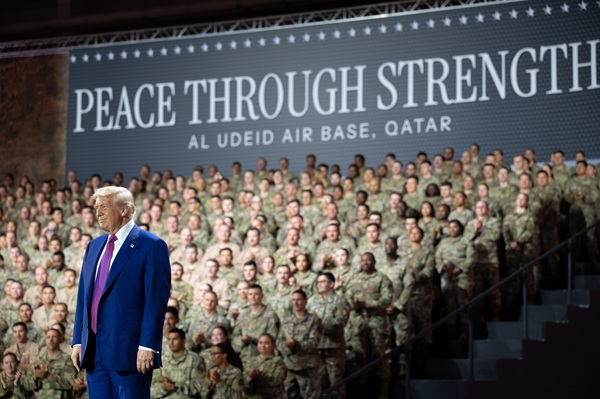.png)

Lt Gen Syed Ata Hasnain is a former Commander of India’s Kashmir Corps and Chancellor of the Central University of Kashmir.
September 10, 2025 at 1:42 PM IST
The Israeli strike on Hamas leadership in Doha this week represents something far more than a tactical military move. It strikes at the heart of international diplomacy, challenges the ethics of sanctuary, and raises some questions about the evolving norms of state behaviour in conflict. While it may look like a decisive Israeli success in the short term, it could prove to be just one more milestone in a conflict that refuses to die, and perhaps even a harbinger of how wars will be fought in the twenty-first century, especially with the development and refinement of long-range precision guided munitions.
Targeting the Mediator
Qatar has, for years, played the delicate role of mediator between Israel, Hamas, and international stakeholders. It has been central to ceasefire negotiations, prisoner exchanges, and the delivery of humanitarian aid to Gaza. No doubt, Doha has also had the distinction of being the safe haven for Hamas’ exiled leadership, allowing the political bureau to operate with relative freedom.
Israel’s attack on Qatari soil effectively shattered this balance. It was a message not just to Hamas but to the mediators themselves; that hosting adversaries comes with risks. But this raises an awkward contradiction. By striking in Doha, Israel has undermined the very country that has been essential in keeping dialogue alive. The strike could destabilise future mediation efforts and erode trust in Qatar’s ability to function as a neutral broker. It may also deter other states from taking on similar roles in the future, for fear of inviting military action onto their soil.
Illusion of Condemnation
The asymmetry here is stark. Israel knows it can weather rhetorical outrage because the only voice that truly matters, the US, is going to fully back it. This dynamic emboldens Israel to act with full audacity, knowing that “international condemnation” will be ineffective unless backed by the US.
As with many high-profile strikes, the immediate aftermath is awash in uncertainty. Conflicting reports swirl about the fate of Hamas leaders. Some say senior figures survived, but casualties were heavier than Hamas admits. This ambiguity itself is part of the psychological warfare. For Israel, the operation sends a message even if the leadership remains intact. No one is beyond reach; that is the message. For Hamas, the challenge is to project resilience and deny Israel the satisfaction of claiming a decisive blow.
Beyond the question of whether individuals live or die lies a deeper structural issue. Leadership in organisations like Hamas cannot be replaced overnight. Figures who have spent decades building image, legitimacy, ideological authority, and financial networks are not easily substituted. Even if successors emerge, they may lack the gravitas to command loyalty or coordinate effectively. That fragility is precisely what Israel seeks to exploit with an aim of ensuring it is not allowed to rebuild.
Doctrine of No Sanctuary
As stated above, Israel’s action conveys an uncompromising principle. Terrorist leadership will not find sanctuary, anywhere. This doctrine has been applied before, whether in targeted killings in Lebanon, Syria, or even further afield. But striking in Doha, a wealthy, US-aligned Gulf monarchy, represents a bold extension of that logic. It is a warning not only to Hamas but to any adversary. Geography is just not a protection.
The strike is also a signal to states that host other hostile actors. Be it Qatar with Hamas, Lebanon with Hezbollah, or Iran with its constellation of proxies, Israel is telling governments that tolerating enemies of Israel on your soil carries consequences. Safe havens are now liabilities. The concept is novel, afforded and facilitated by precision weapons.
This reflects a broader trend in modern conflict. States increasingly reserve the right to project force into third countries, regardless of direct enmity. We have seen it in Israel’s missile exchanges with Iran, in its bombardments of Lebanon, and — beyond the Middle East — in India’s Operation Sindoor, when New Delhi struck terror facilities inside Pakistan. The traditional notion that sovereign territory protects one from the conflicts of others is eroding. The future may belong to this model of transnational, ‘border-agnostic’ warfare.
Narratives of Dominance
Israel’s military calculus is inseparable from its narrative objectives. By striking in Doha, Israel reinforces the story it wants told; that no Palestinian or Arab force can contest its preponderance of power. Hamas’s leaders are not untouchable resistance icons but fugitives, vulnerable wherever they hide. For Israel, this is not merely about killing adversaries. It is about shaping perceptions.
Every strike underscores the futility of resistance and the omnipotence of Israeli intelligence and airpower. In this narrative, Israel is the arbiter of life and death, dictating the terms of engagement, and denying legitimacy to any armed challenger. The strike in Doha is as much a message to Palestinians as it is to Hamas: contesting Israel militarily will always end in humiliation and loss. Is the era of proxy war therefore drawing to a close, at least in the Middle East? Conversely, do nations hosting sponsoring proxies have to find new means of force protection.
Pyrrhic Victory?
Yet, for all the boldness of the operation, the strategic horizon remains cloudy. Groups under pressure often adapt, splinter, or radicalise. The decapitation of leadership does not necessarily equate to dissolution. If Hamas weakens, more extreme factions may emerge, or the organisation may evolve into a looser, more decentralised resistance. The narrative of victimhood and resistance, central to Palestinian identity under occupation, is unlikely to be erased by one spectacular strike. We have seen this through the historical context.
Moreover, the erosion of diplomatic space carries long-term risks. By undermining Qatar’s mediating role, Israel may find itself with fewer channels of communication in moments of crisis. The region’s fragile scaffolding of dialogue could collapse, making future escalations harder to manage. I do foresee this as a trigger to more consultation within the Gulf States regarding their security vis-à-vis Israel. It is something taken for granted now but may not remain forever.
Perhaps the most significant question raised by this strike is what it tells us about the future of conflict. The norms that once restrained states from striking outside their immediate battlefields are dissolving. Sovereignty is no longer a guarantee of safety when militant actors operate across borders. Israel, Iran, India, the US, Turkey, and others have all demonstrated a willingness to strike beyond their borders in pursuit of enemies.
The world may be moving into an era where states increasingly act unilaterally, disregarding the old rules that sanctified borders. International law lags behind these realities, and global institutions seem powerless to enforce restraint. If Doha can be struck today, why not Ankara, Riyadh, or even a European capital tomorrow? As states normalise such behaviour, the threshold for escalation lowers, and the risk of great-power entanglement rises. India is one of those nations which still respects norms and boundaries but has demonstrated its will to hunt down its enemies beyond.
Israel’s strike in Doha was not just another episode in its long conflict with Hamas. It was an event that crystallised multiple trends. The erosion of sanctuaries, the irrelevance of condemnation without enforcement, and the dominance of hard power over diplomacy. What is evident is that none of this will buy Israel permanent peace.
The deeper significance lies in what this foreshadows. Warfare is no longer confined by geography or traditional notions of sovereignty. Enemies will be pursued across borders, sanctuaries will be denied, and mediators themselves may be swept into the line of fire. This is the new normal. What happened in Doha is not just a tactical strike, it is a warning that the wars of tomorrow may have no safe havens, no sanctuaries, and no neutral spaces.
As this issue develops and ethics, norms etc. about sanctuaries erode further we can visualise that opportunities will open up for India but equally precision weapons can be double sided with deniability. Nukes may yet not fall into terrorist hands but such weapons are no regime of control.
India needs to remain wary of this and examine the threats now rather than when they reach an advanced stage of implementation.




